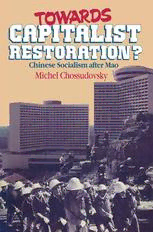
Towards Capitalist Restoration?: Chinese Socialism After Mao PDF
Preview Towards Capitalist Restoration?: Chinese Socialism After Mao
Towards Capitalist Restoration? Chinese Socialism After Mao Also by Michel Chossudovsky Poverty in Venezuela (in Spanish) Is the Canadian Economy Closing Down'! (with F. Caloren and P. Gingrich) Unemployment on a World Scale (in Italian, with E. Alvrater, S. Amin, A Gunder Frank and H. Jaffe) Towards Capitalist Restoration? Chinese Socialism After Mao Michel Chossudovsky Macmillan Education ISBN 978-0-333-38441-1 ISBN 978-1-349-18415-6 (eBook) DOI 10.1007/978-1-349-18415-6 ©Michel Chossudovsky, 1986 Softcover reprint of the hardcover 1st edition 1986 All rights reserved. For information, write: Scholarly & Reference Division, St. Martin's Press, Inc., 175 Fifth Avenue, New York, NY 10010 First published in the United States of American in 1986 ISBN 978-0-312-81134-1 ISBN 978-0-312-81135-8 (Pbk.) Library of Congress Cataloguing-in-Publication Data Chossudovsky, Michel. Towards Capitalist Restoration? Bibliography: p. Includes index. 1. Communism-China. 2. Capitalism-China. 3. China-Economic policy-1976- . I. Title. HX418.5.C488 1986 335.43'45 86-6684 ISBN 978-0-312-81134-1 ISBN 978-0-312-81135-8 (Pbk.) To Natacha Contents List of Tables X Acknowledgements X Preface xi Map of China's Administrative Divisions xiii Abbreviations xiv INTRODUCTION I I THE POLITICAL TRANSITION 8 Deng Xiaoping's Rise to Political Power 8 The purges 11 Mao Zedong and Mao Zedong Thought 18 The CCP's Rapprochement with the Kuomintang 20 Concluding Remarks 22 2 LAND REFORM AND COLLECTIVISATION 24 Introduction 24 Land Tenure and Class Relations prior to 1949 26 The Agrarian Revolution 28 The Agrarian Revolution in China and Soviet Russia 31 Land Reform after Liberation 33 Collectivisation and the 'Rectification Movement' 36 From the Great Leap to the Cultural Revolution 37 Concluding Remarks 40 3 THE DECOLLECTIVISAT ION OF AGRICULTURE 42 Introduction 42 The Household Responsibility System 45 The Institutional Collapse of the People's Commune 46 Decollectivisation and the Ownership of Land 48 The Privatisation of Farm Machinery 49 Farm Mechanisation and Surplus Farm Labour 54 The Concentration of Land 56 Vll viii Contents Restoration of the Rich Peasant Economy 59 Proletarianisation of the Poor Peasantry 60 Social Inequality and the Rural Distribution of Income 62 The Accumulation and Public Welfare Funds 65 The Rural Industries 67 The Liberalisation of Agricultural Markets 70 Land-Use Patterns 71 Decollectivisation and the Open Door Policy 72 Concluding Remarks 75 4 STATE CAPITALISM IN INDUSTRY 77 Introduction 77 The National Bourgeoisie 79 Bureaucratic Management under Socialism 83 Factory Management after Mao 87 The Transfer of Scientific Management 93 Concluding Remarks 101 5 WAGES AND THE LABOUR PROCESS 102 Introduction 102 The Structure of Wages Prior to Liberation 103 Wages Under New Democracy 103 Wages During the Cultural Revolution 105 The Structure of Wages after Mao 108 Concluding Remarks 113 6 'MARKET SOCIALISM' OR 'MARKET CAPITALISM'? 115 Introduction 115 Profit Maximisation 115 'Socialist Competition' 117 'Market Socialism' and the Open Door to Foreign Capital 120 Market Socialism and the Law of Value 121 'Market Socialism' or 'Market Capitalism'? 122 Economic Growth and the Market Process 124 Concluding Remarks 130 7 THE OPEN DOOR TO FOREIGN CAPITAL 132 Introduction 132 The Open Door in Historical Perspective 134 The Structure of Foreign Trade after Liberation 137 Contents IX The Open Door After Mao 138 The Expatriate Bourgeoisie 140 The Transfer of 'Western' Consumption Patterns 144 The Transition to Socialism 146 8 TRANSNATIONAL CAPITAL IN SOCIALIST CHINA 148 Joint Ventures 148 Compensation Trade and Export Processing 151 Joint Ventures, Selected Case Studies 152 'Extraterritoriality under Socialism' 160 Foreign Capital in Off-shore Oil 165 9 CHINA AND WORLD CAPITALISM 172 Introduction 172 The International Division of Labour, Historical Perspective on the 'Migration' of Capital and Labour 173 The World Relative Surplus Population 176 Structural Recession in the Advanced Capitalist Countries 177 The Low Wage Economy 178 China's Manpower Exports 180 Unequal Exchange 183 Concluding Remarks 188 10 SINO-US STRATEGIC RELATIONS 191 Mao's Paper Tiger Diplomacy 191 Sino-US Strategic Rapprochement 192 The 'Open Door' to Military Technology 196 Defence Spending and the International Division of Labour 197 China's RealPolitik in South-East Asia 198 Concluding Remarks 199 11 TOWARDS THE RESTORATION OF CAPITALISM? 201 Introduction 201 Class Relations after Mao 203 Transition towards Capitalism? 214 The Future of Socialism 220 References 222 Bibliography 238 Index 248 List of Tables 2.1 Distribution of landownership among the various rural classes in Guangdong in the early 1930s 27 3.1 The relationship between free market and state-regulated prices 70 4.1 Management structures, selected factories 94 5.1 The structure of industrial wages, selected factories 110 8.1 Petroleum consortia in the South China Sea 169 9.1 Price-cost structure in the Chinese garment export industry 186 9.2 Price-cost structure in the Hong Kong garment export industry 187 Acknowledgements The author and publishers wish to thank the following who have kindly given permission for the use of copyright material: Foreign Languages Press for excerpts from Selected Works of Deng Xiaoping, Resolution on Certain Questions in the History of Our Party, Selected Works of Mao Zedong and China's Socialist Economy by Xue Muqiao; Monthly Review Foundation for excerpts from China Since Mao by Charles Bettelheim © Monthly Review Press (1978); M. E. Sharpe, Inc. for excerpt from 'Strengthen the Party's Leadership' by Li Hsueh Feng, Chinese Law and Government, no. 1 (1980); Every effort has been made to trace all the copyright-holders, but if any have been inadvertently overlooked the publishers will be pleased to make the necessary arrangement at the first opportunity. X
